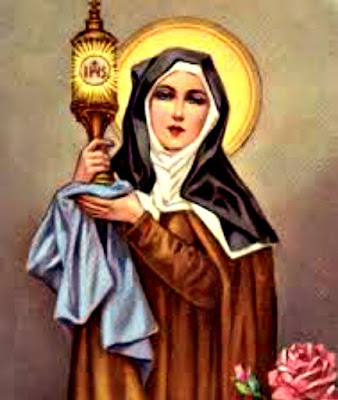Five Frequent Questions Catholics are asked and how to respond to them
Here are the questions and brief answers to each:
1. Why do you worship wafers?
What appears to the human eye as a wafer at a Catholic Mass or enclosed in a monstrance at an Adoration Chapel is actually the Body and Blood of Christ, and not merely bread. Thus, Catholics are not worshiping a wafer, but are actually worshiping Jesus. Because Jesus is truly present - body, blood, soul and divinity - we adore the Eucharist with profound reverence. The sacrament of the Eucharist was instituted by Christ at the Last Supper: "While they were eating, Jesus took bread, and when he had given thanks, he broke it and gave it to his disciples, saying, “Take and eat; this is my body.” Then he took a cup and when he had given thanks, he gave it to them, saying, “Drink from it, all of you. This is my blood of the covenant, which is poured out for many for the forgiveness of sins.” (Mt.26:26-28)
In the Eucharist, we find the real presence of Jesus Christ. "Jesus said to them, 'Amen, amen, I say to you, unless you eat the flesh of the Son of Man and drink his blood, you do not have life within you. Whoever eats my flesh and drinks my blood has eternal life, and I will raise him on the last day. For my flesh is true food, and my blood is true drink. Whoever eats my flesh and drinks my blood remains in me and I in him'." (John 6:53-56) Jesus is speaking literally, and many of his followers respond with " This saying is hard; who can accept it?" (John 6:60) Because Jesus continues to insist in this literal interpretation, many of his followers leave. Paul agrees with this interpretation and warns the Corinthians of the dangers of receiving the Eucharist unworthily: "So then, whoever eats the bread or drinks the cup of the Lord in an unworthy manner will be guilty of sinning against the body and blood of the Lord. Everyone ought to examine themselves before they eat of the bread and drink from the cup. For those who eat and drink without discerning the body of Christ eat and drink judgment" on themselves (Cor.11:27-29). If the Eucharist were just a symbol, there would be no need to partake of it worthily.
2. Why do you worship Mary?
Catholics do not worship Mary. We venerate her as the Mother of God. In fact, we give the Blessed Virgin Mary the highest honor because she has a special place in God's creation. She is highest of God's creatures (higher than the angels) and the only creature who was honored by God so greatly that his son took his flesh from her. The fact that God took on flesh and became man (John 1:1, 14) makes Mary a key figure in God's plan of salvation.
3. Why do you pray to idols (statues)?
Catholics do not pray to statues. To do so would be a violation of the first commandment. Catholics use statues, paintings, and other artistic works to help us recall the person or event depicted. Just as we use photos to remember our loved ones and statues to honor the memory of our heroes, we honor our saints in the same way. In the early Church, many members of the congregation were illiterate, so paintings, statues, and other works of art were used to instruct them in the faith. Today these depictions of our beloved saints, our Blessed Mother, and events or scenes from the Bible serve as visual reminders of the story of our beautiful Catholic faith. Even Protestants use pictures of Jesus and other Bible pictures in Sunday school for teaching children. They are, in short, visual aids.
4. Are you saved?
As Catholics, we believe that we must cooperate with God’s grace in order to receive the salvation won by Him on the cross and offered to us. We believe that our cooperation has to last until the end of our life in order to reach final and ultimate salvation in heaven. As Catholics, we profess that we "work out our salvation with fear and trembling" (Phil 2:12). We proclaim that salvation is an ongoing process: we were saved (once, 2000 years ago by Christ's atoning death on the cross, and at the moment of our Baptism), we are being saved continuously throughout our lives,(each day when we turn away from sin and turn toward God) and we hope to be saved (on judgement day).
5. Why do you confess your sins to a priest?
As the Son of Man, Jesus was sent by God to forgive man's sins. Jesus passed on this power to forgive sins in God's name to the apostles. "(Jesus) said to them again, 'Peace be with you. As the Father has sent me, so I send you.' And when he had said this, he breathed on them and said to them, 'Receive the holy Spirit."Whose sins you forgive are forgiven them, and whose sins you retain are retained.'" (John 20:21-23)
But how can one know what sins to forgive or what sins to retain unless these are made known; that means unless they are confessed? This experience of confession of sins to a priest to receive the sign of God’s healing forgiveness is called by the Church the Sacrament of Penance or the Sacrament of Reconciliation. We are once more made one with God. Jesus intended this power to be exercised not only by the Apostles, but also by their successors for the good of sinners.
In Matthew, we read: "All power in heaven and on earth has been given to me. Go, therefore, and make disciples of all nations, baptizing them in the name of the Father, and of the Son, and of the holy Spirit, teaching them to observe all that I have commanded you." (Mt. 28, 17-19). Now, as Catholics, we believe that by ordination, a priest is given as much power to minister God’s healing forgiveness as the Apostles themselves possessed.
So the first reason why Catholics confess their sins to a priest is that God has chosen to express his forgiving love this way. Our humanity is sacred to God, He reaches out to us through and in accord with our humanity. God knows that one of our needs is to be certain, to be reassured. God wants me to know with faith assurance that when I am sincerely repentant, when I am truly sorry, that He has forgiven my sins. Again and again Jesus showed His love through outward, external signs. The words said by the priest, "I absolve you from all your sins in the Name of the Father, and of the Son and of the Holy Spirit," are those faith-signs of the certainty of God’s forgiveness.
Another need that we have is to get things off our chest. We may know what is bothering us, but until we speak about it to someone else, the burden remains heavy. In the actual confession of our sinfulness to a priest, there is also a human feeling of being made free. In our letting go, God’s healing grace renews us and by the humbling experience of admitting our sins to another, we are responding to God’s call. A humble and contrite heart God will not spurn.
Besides being at one with God, Jesus indicated that we need to be at peace with one another. In Matthew 5:23, Jesus said: "If you bring your gift to the altar, and there recall that your brother has anything against you, leave your gift there at the altar, go first and be reconciled with your brother, and then come and offer your gift."
Sin is both personal and communal. It affects me and my relationship with God. Practically, I cannot go to everyone personally and ask forgiveness, but the priest, as confessor and leader, represents the Church, the Community of Faith. In the experience of confession I am not only asking God to forgive me, but I am also asking the same from my brothers and sisters in the Lord. Faith in Jesus opens me to receive the sign of the Father’s forgiveness, healing and love each time I confess my sins this way.





My five answers:
ReplyDelete1. Why do you worship wafers?
We don't.
2. Why do you worship the Virgin Mary?
We don't. We just love and venerate her.
3. Why do you worship pictures?
We don't. (Personally, I love art, and a story without pictures is a less-effective story.)
4. Are you saved?
Why? Aren't you?
5. Why do you confess to a priest?
Because it's cheaper than confessing to a psychiatrist.
God bless you.